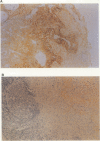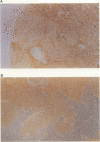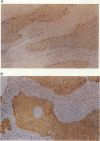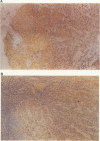Abstract
Reductions in cell-cell adhesion and stromal and vascular invasion are essential steps in the progression from localized malignancy to metastatic disease. In this study, changes in the expression of the components of the E-cadherin-catenin cell adhesion complex have been investigated using immunohistochemical techniques in primary tumours and nodal metastases from 36 patients with squamous cell carcinoma of the head and neck. For 14 patients the corresponding primary and nodal metastases samples were available. None of the 51 samples showed normal E-cadherin expression when compared with either the adjacent normal squamous epithelium or with normal colonic epithelium that was used as positive control material. In 88% of primary tumours fewer than 50% of cells exhibited normal membranous E-cadherin expression. Loss of membranous E-cadherin expression was more extensive in poorly differentiated carcinomas while, in individual carcinomas, membranous E-cadherin expression was stronger in those parts of the neoplasm that expressed the differentiation marker involucrin. Expression of beta-catenin generally paralleled that of E-cadherin, but in 12 cases there was strong membranous beta-catenin expression in samples that exhibited predominantly cytoplasmic E-cadherin labelling. Expression of alpha-catenin was generally weak and did not correlate with the expression of either beta-catenin or E-cadherin. Marked intratumoral heterogeneity for protein expression was evident for all antibodies, and the abnormal expression of the catenins is a novel finding. E-cadherin is expressed more intensely in cells with greater squamous differentiation, but there was no correlation between the decreased expression of any of the adhesion molecules of the E-cadherin complex tested and local recurrence, metastasis or survival. The loss of expression of components of the E-cadherin complex is a common abnormality in squamous carcinomas and, while it may be permissive for metastasis, it does not appear to be the only determinant of this process.
Full text
PDF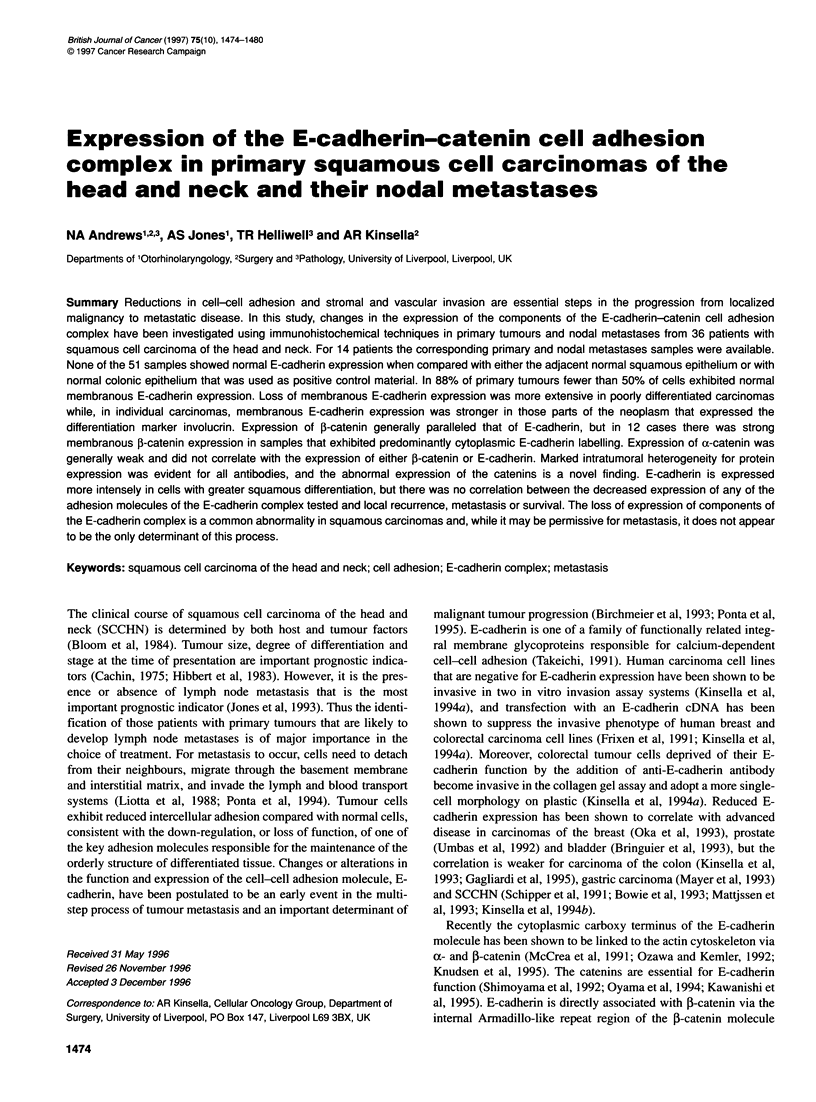
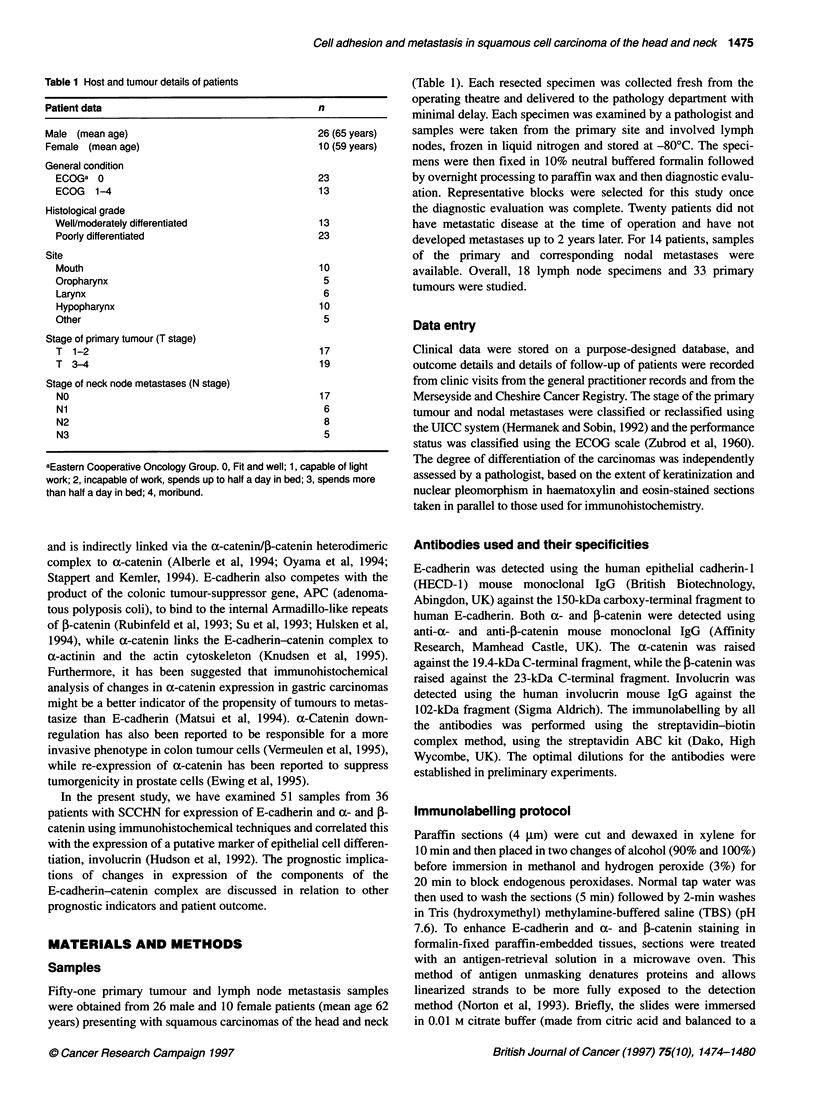
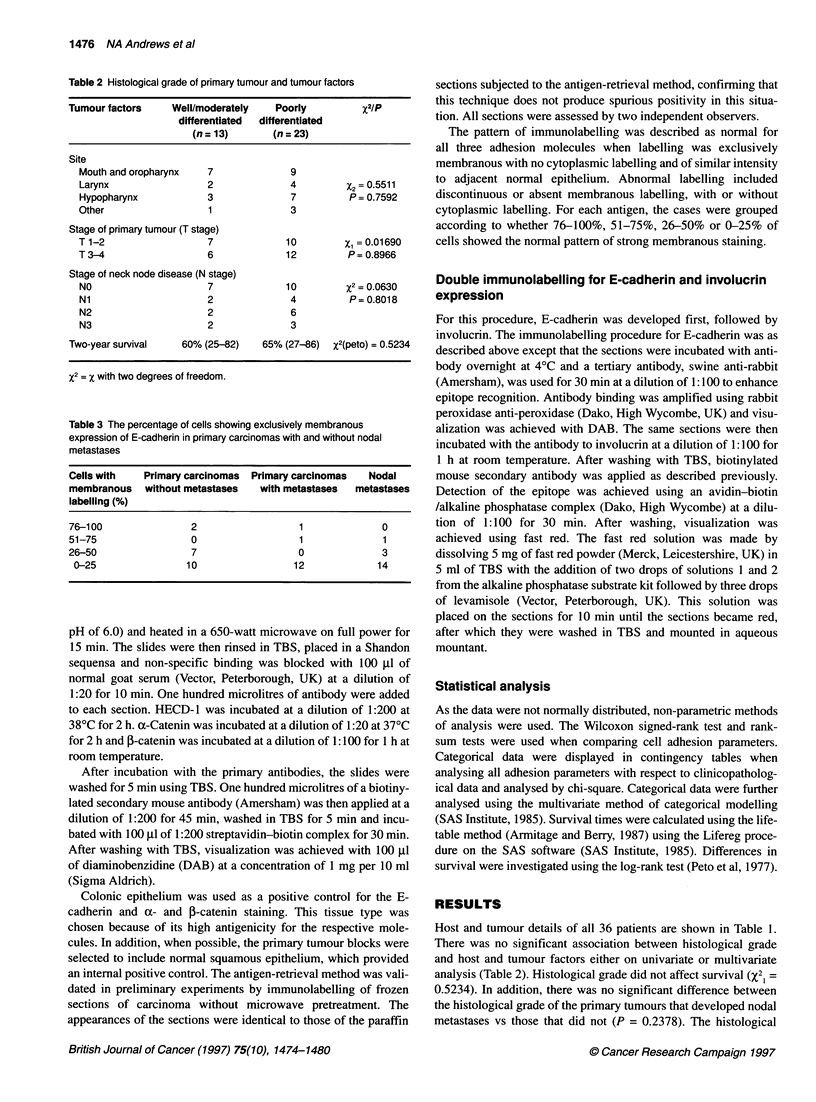
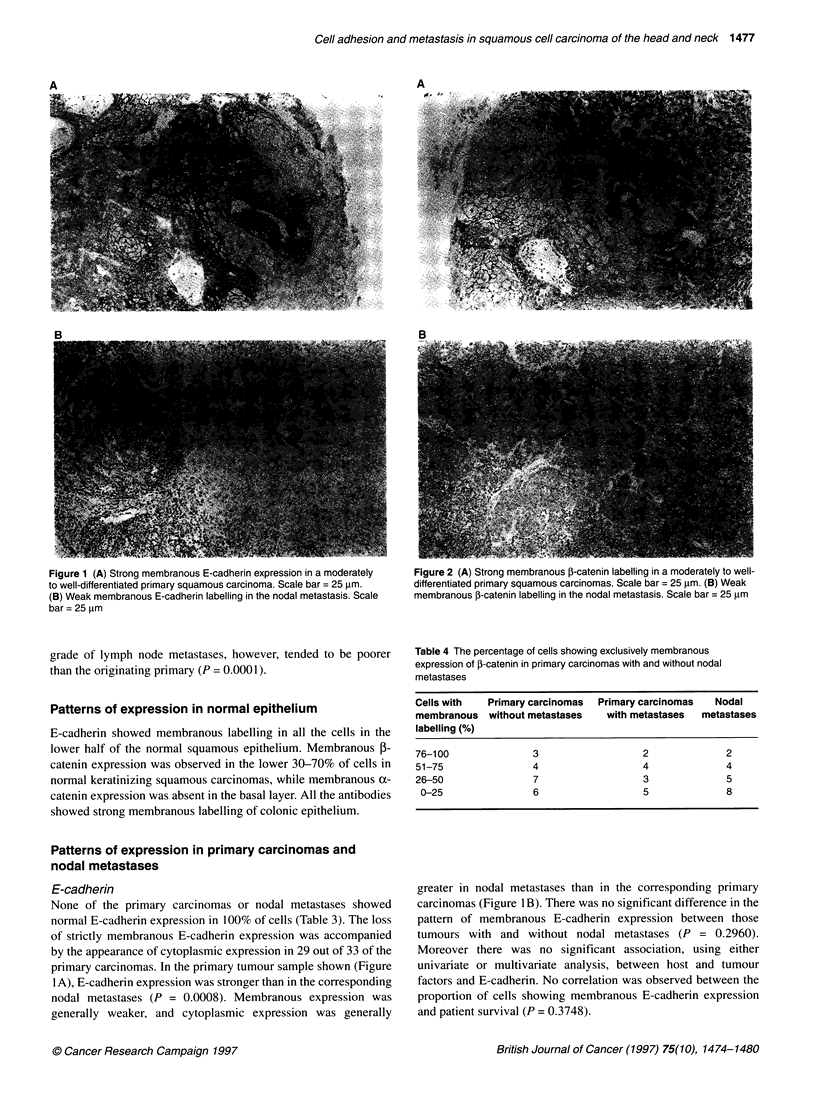
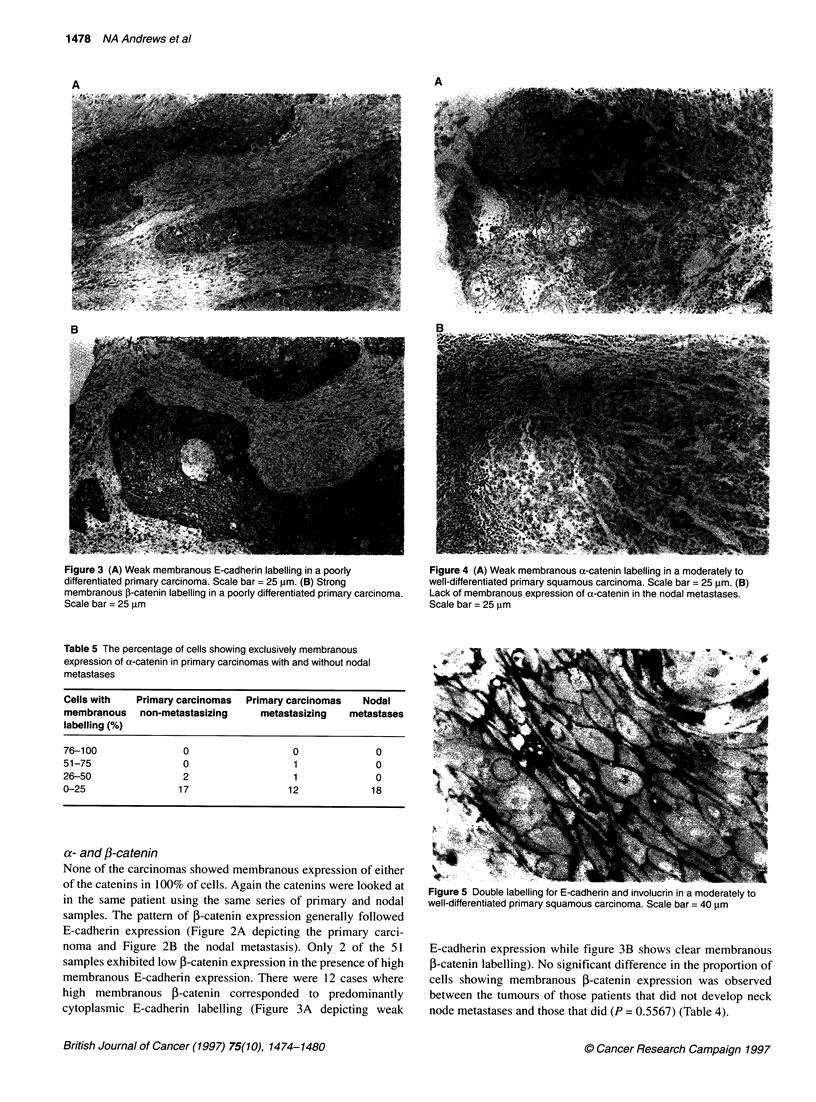
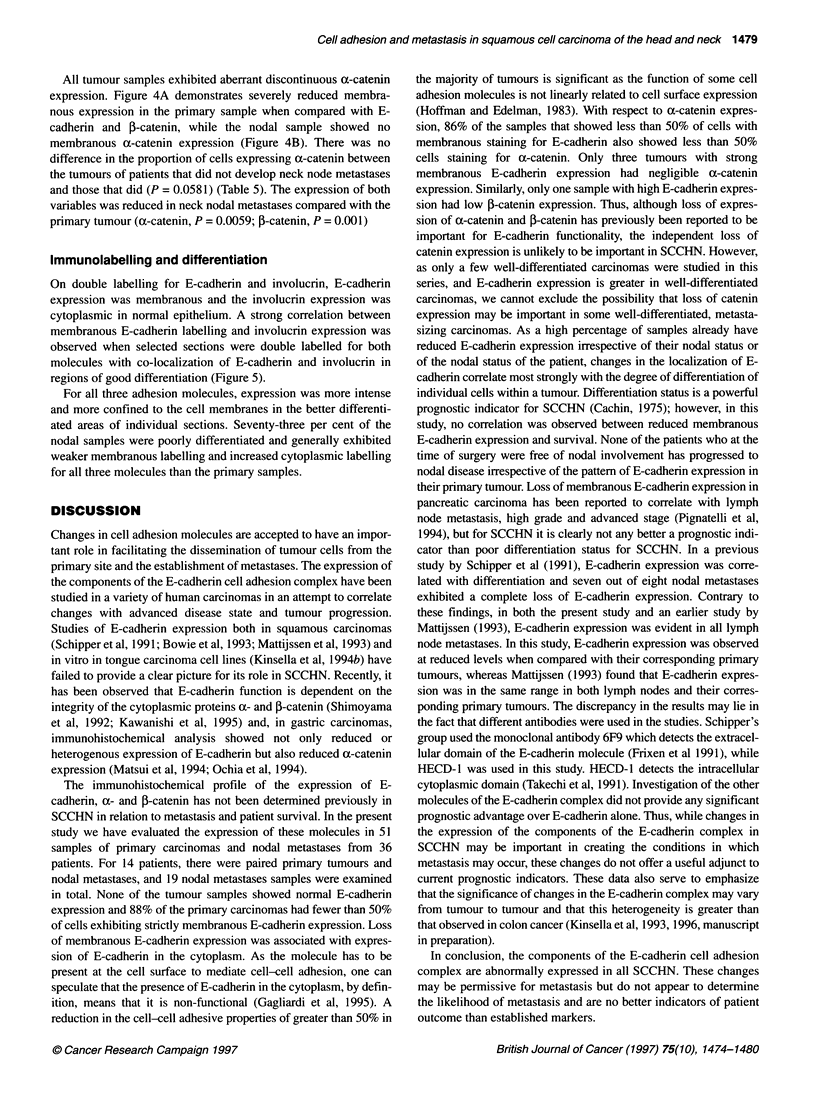
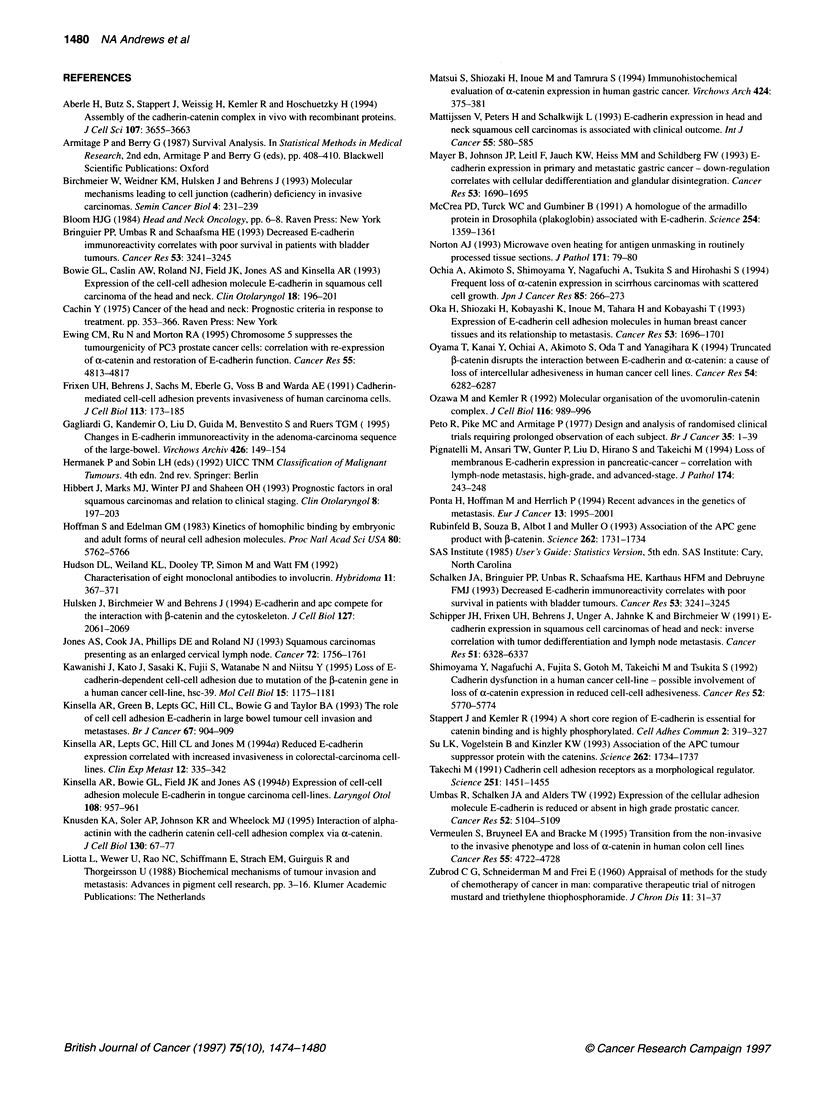
Images in this article
Selected References
These references are in PubMed. This may not be the complete list of references from this article.
- Aberle H., Butz S., Stappert J., Weissig H., Kemler R., Hoschuetzky H. Assembly of the cadherin-catenin complex in vitro with recombinant proteins. J Cell Sci. 1994 Dec;107(Pt 12):3655–3663. doi: 10.1242/jcs.107.12.3655. [DOI] [PubMed] [Google Scholar]
- Birchmeier W., Weidner K. M., Hülsken J., Behrens J. Molecular mechanisms leading to cell junction (cadherin) deficiency in invasive carcinomas. Semin Cancer Biol. 1993 Aug;4(4):231–239. [PubMed] [Google Scholar]
- Bowie G. L., Caslin A. W., Roland N. J., Field J. K., Jones A. S., Kinsella A. R. Expression of the cell-cell adhesion molecule E-cadherin in squamous cell carcinoma of the head and neck. Clin Otolaryngol Allied Sci. 1993 Jun;18(3):196–201. doi: 10.1111/j.1365-2273.1993.tb00829.x. [DOI] [PubMed] [Google Scholar]
- Bringuier P. P., Umbas R., Schaafsma H. E., Karthaus H. F., Debruyne F. M., Schalken J. A. Decreased E-cadherin immunoreactivity correlates with poor survival in patients with bladder tumors. Cancer Res. 1993 Jul 15;53(14):3241–3245. [PubMed] [Google Scholar]
- Bringuier P. P., Umbas R., Schaafsma H. E., Karthaus H. F., Debruyne F. M., Schalken J. A. Decreased E-cadherin immunoreactivity correlates with poor survival in patients with bladder tumors. Cancer Res. 1993 Jul 15;53(14):3241–3245. [PubMed] [Google Scholar]
- Ewing C. M., Ru N., Morton R. A., Robinson J. C., Wheelock M. J., Johnson K. R., Barrett J. C., Isaacs W. B. Chromosome 5 suppresses tumorigenicity of PC3 prostate cancer cells: correlation with re-expression of alpha-catenin and restoration of E-cadherin function. Cancer Res. 1995 Nov 1;55(21):4813–4817. [PubMed] [Google Scholar]
- Frixen U. H., Behrens J., Sachs M., Eberle G., Voss B., Warda A., Löchner D., Birchmeier W. E-cadherin-mediated cell-cell adhesion prevents invasiveness of human carcinoma cells. J Cell Biol. 1991 Apr;113(1):173–185. doi: 10.1083/jcb.113.1.173. [DOI] [PMC free article] [PubMed] [Google Scholar]
- Gagliardi G., Kandemir O., Liu D., Guida M., Benvestito S., Ruers T. G., Benjamin I. S., Northover J. M., Stamp G. W., Talbot I. C. Changes in E-cadherin immunoreactivity in the adenoma-carcinoma sequence of the large bowel. Virchows Arch. 1995;426(2):149–154. doi: 10.1007/BF00192636. [DOI] [PubMed] [Google Scholar]
- Hibbert J., Marks N. J., Winter P. J., Shaheen O. H. Prognostic factors in oral squamous carcinoma and their relation to clinical staging. Clin Otolaryngol Allied Sci. 1983 Jun;8(3):197–203. doi: 10.1111/j.1365-2273.1983.tb01427.x. [DOI] [PubMed] [Google Scholar]
- Hoffman S., Edelman G. M. Kinetics of homophilic binding by embryonic and adult forms of the neural cell adhesion molecule. Proc Natl Acad Sci U S A. 1983 Sep;80(18):5762–5766. doi: 10.1073/pnas.80.18.5762. [DOI] [PMC free article] [PubMed] [Google Scholar]
- Hudson D. L., Weiland K. L., Dooley T. P., Simon M., Watt F. M. Characterisation of eight monoclonal antibodies to involucrin. Hybridoma. 1992 Jun;11(3):367–379. doi: 10.1089/hyb.1992.11.367. [DOI] [PubMed] [Google Scholar]
- Hülsken J., Birchmeier W., Behrens J. E-cadherin and APC compete for the interaction with beta-catenin and the cytoskeleton. J Cell Biol. 1994 Dec;127(6 Pt 2):2061–2069. doi: 10.1083/jcb.127.6.2061. [DOI] [PMC free article] [PubMed] [Google Scholar]
- Jones A. S., Cook J. A., Phillips D. E., Roland N. R. Squamous carcinoma presenting as an enlarged cervical lymph node. Cancer. 1993 Sep 1;72(5):1756–1761. doi: 10.1002/1097-0142(19930901)72:5<1756::aid-cncr2820720540>3.0.co;2-5. [DOI] [PubMed] [Google Scholar]
- Kawanishi J., Kato J., Sasaki K., Fujii S., Watanabe N., Niitsu Y. Loss of E-cadherin-dependent cell-cell adhesion due to mutation of the beta-catenin gene in a human cancer cell line, HSC-39. Mol Cell Biol. 1995 Mar;15(3):1175–1181. doi: 10.1128/mcb.15.3.1175. [DOI] [PMC free article] [PubMed] [Google Scholar]
- Kinsella A. R., Bowie G. L., Field J. K., Jones A. S. Expression of the cell-cell adhesion molecule E-cadherin in tongue carcinoma cell lines. J Laryngol Otol. 1994 Nov;108(11):957–961. doi: 10.1017/s0022215100128622. [DOI] [PubMed] [Google Scholar]
- Kinsella A. R., Green B., Lepts G. C., Hill C. L., Bowie G., Taylor B. A. The role of the cell-cell adhesion molecule E-cadherin in large bowel tumour cell invasion and metastasis. Br J Cancer. 1993 May;67(5):904–909. doi: 10.1038/bjc.1993.169. [DOI] [PMC free article] [PubMed] [Google Scholar]
- Kinsella A. R., Lepts G. C., Hill C. L., Jones M. Reduced E-cadherin expression correlates with increased invasiveness in colorectal carcinoma cell lines. Clin Exp Metastasis. 1994 Jul;12(4):335–342. doi: 10.1007/BF01753841. [DOI] [PubMed] [Google Scholar]
- Knudsen K. A., Soler A. P., Johnson K. R., Wheelock M. J. Interaction of alpha-actinin with the cadherin/catenin cell-cell adhesion complex via alpha-catenin. J Cell Biol. 1995 Jul;130(1):67–77. doi: 10.1083/jcb.130.1.67. [DOI] [PMC free article] [PubMed] [Google Scholar]
- Liotta L. A., Wewer U., Rao N. C., Schiffmann E., Stracke M., Guirguis R., Thorgeirsson U., Muschel R., Sobel M. Biochemical mechanisms of tumor invasion and metastases. Prog Clin Biol Res. 1988;256:3–16. [PubMed] [Google Scholar]
- Matsui S., Shiozaki H., Inoue M., Tamura S., Doki Y., Kadowaki T., Iwazawa T., Shimaya K., Nagafuchi A., Tsukita S. Immunohistochemical evaluation of alpha-catenin expression in human gastric cancer. Virchows Arch. 1994;424(4):375–381. doi: 10.1007/BF00190559. [DOI] [PubMed] [Google Scholar]
- Mattijssen V., Peters H. M., Schalkwijk L., Manni J. J., van 't Hof-Grootenboer B., de Mulder P. H., Ruiter D. J. E-cadherin expression in head and neck squamous-cell carcinoma is associated with clinical outcome. Int J Cancer. 1993 Oct 21;55(4):580–585. doi: 10.1002/ijc.2910550411. [DOI] [PubMed] [Google Scholar]
- Mayer B., Johnson J. P., Leitl F., Jauch K. W., Heiss M. M., Schildberg F. W., Birchmeier W., Funke I. E-cadherin expression in primary and metastatic gastric cancer: down-regulation correlates with cellular dedifferentiation and glandular disintegration. Cancer Res. 1993 Apr 1;53(7):1690–1695. [PubMed] [Google Scholar]
- McCrea P. D., Turck C. W., Gumbiner B. A homolog of the armadillo protein in Drosophila (plakoglobin) associated with E-cadherin. Science. 1991 Nov 29;254(5036):1359–1361. doi: 10.1126/science.1962194. [DOI] [PubMed] [Google Scholar]
- Norton A. J. Microwave oven heating for antigen unmasking in routinely processed tissue sections. J Pathol. 1993 Oct;171(2):79–80. doi: 10.1002/path.1711710203. [DOI] [PubMed] [Google Scholar]
- Ochiai A., Akimoto S., Shimoyama Y., Nagafuchi A., Tsukita S., Hirohashi S. Frequent loss of alpha catenin expression in scirrhous carcinomas with scattered cell growth. Jpn J Cancer Res. 1994 Mar;85(3):266–273. doi: 10.1111/j.1349-7006.1994.tb02092.x. [DOI] [PMC free article] [PubMed] [Google Scholar]
- Oka H., Shiozaki H., Kobayashi K., Inoue M., Tahara H., Kobayashi T., Takatsuka Y., Matsuyoshi N., Hirano S., Takeichi M. Expression of E-cadherin cell adhesion molecules in human breast cancer tissues and its relationship to metastasis. Cancer Res. 1993 Apr 1;53(7):1696–1701. [PubMed] [Google Scholar]
- Oyama T., Kanai Y., Ochiai A., Akimoto S., Oda T., Yanagihara K., Nagafuchi A., Tsukita S., Shibamoto S., Ito F. A truncated beta-catenin disrupts the interaction between E-cadherin and alpha-catenin: a cause of loss of intercellular adhesiveness in human cancer cell lines. Cancer Res. 1994 Dec 1;54(23):6282–6287. [PubMed] [Google Scholar]
- Ozawa M., Kemler R. Molecular organization of the uvomorulin-catenin complex. J Cell Biol. 1992 Feb;116(4):989–996. doi: 10.1083/jcb.116.4.989. [DOI] [PMC free article] [PubMed] [Google Scholar]
- Peto R., Pike M. C., Armitage P., Breslow N. E., Cox D. R., Howard S. V., Mantel N., McPherson K., Peto J., Smith P. G. Design and analysis of randomized clinical trials requiring prolonged observation of each patient. II. analysis and examples. Br J Cancer. 1977 Jan;35(1):1–39. doi: 10.1038/bjc.1977.1. [DOI] [PMC free article] [PubMed] [Google Scholar]
- Pignatelli M., Ansari T. W., Gunter P., Liu D., Hirano S., Takeichi M., Klöppel G., Lemoine N. R. Loss of membranous E-cadherin expression in pancreatic cancer: correlation with lymph node metastasis, high grade, and advanced stage. J Pathol. 1994 Dec;174(4):243–248. doi: 10.1002/path.1711740403. [DOI] [PubMed] [Google Scholar]
- Ponta H., Hofmann M., Herrlich P. Recent advances in the genetics of metastasis. Eur J Cancer. 1994;30A(13):1995–2001. doi: 10.1016/0959-8049(94)00393-j. [DOI] [PubMed] [Google Scholar]
- Rubinfeld B., Souza B., Albert I., Müller O., Chamberlain S. H., Masiarz F. R., Munemitsu S., Polakis P. Association of the APC gene product with beta-catenin. Science. 1993 Dec 10;262(5140):1731–1734. doi: 10.1126/science.8259518. [DOI] [PubMed] [Google Scholar]
- Schipper J. H., Frixen U. H., Behrens J., Unger A., Jahnke K., Birchmeier W. E-cadherin expression in squamous cell carcinomas of head and neck: inverse correlation with tumor dedifferentiation and lymph node metastasis. Cancer Res. 1991 Dec 1;51(23 Pt 1):6328–6337. [PubMed] [Google Scholar]
- Shimoyama Y., Nagafuchi A., Fujita S., Gotoh M., Takeichi M., Tsukita S., Hirohashi S. Cadherin dysfunction in a human cancer cell line: possible involvement of loss of alpha-catenin expression in reduced cell-cell adhesiveness. Cancer Res. 1992 Oct 15;52(20):5770–5774. [PubMed] [Google Scholar]
- Stappert J., Kemler R. A short core region of E-cadherin is essential for catenin binding and is highly phosphorylated. Cell Adhes Commun. 1994 Aug;2(4):319–327. doi: 10.3109/15419069409014207. [DOI] [PubMed] [Google Scholar]
- Su L. K., Vogelstein B., Kinzler K. W. Association of the APC tumor suppressor protein with catenins. Science. 1993 Dec 10;262(5140):1734–1737. doi: 10.1126/science.8259519. [DOI] [PubMed] [Google Scholar]
- Takeichi M. Cadherin cell adhesion receptors as a morphogenetic regulator. Science. 1991 Mar 22;251(5000):1451–1455. doi: 10.1126/science.2006419. [DOI] [PubMed] [Google Scholar]
- Umbas R., Schalken J. A., Aalders T. W., Carter B. S., Karthaus H. F., Schaafsma H. E., Debruyne F. M., Isaacs W. B. Expression of the cellular adhesion molecule E-cadherin is reduced or absent in high-grade prostate cancer. Cancer Res. 1992 Sep 15;52(18):5104–5109. [PubMed] [Google Scholar]
- Vermeulen S. J., Bruyneel E. A., Bracke M. E., De Bruyne G. K., Vennekens K. M., Vleminckx K. L., Berx G. J., van Roy F. M., Mareel M. M. Transition from the noninvasive to the invasive phenotype and loss of alpha-catenin in human colon cancer cells. Cancer Res. 1995 Oct 15;55(20):4722–4728. [PubMed] [Google Scholar]



